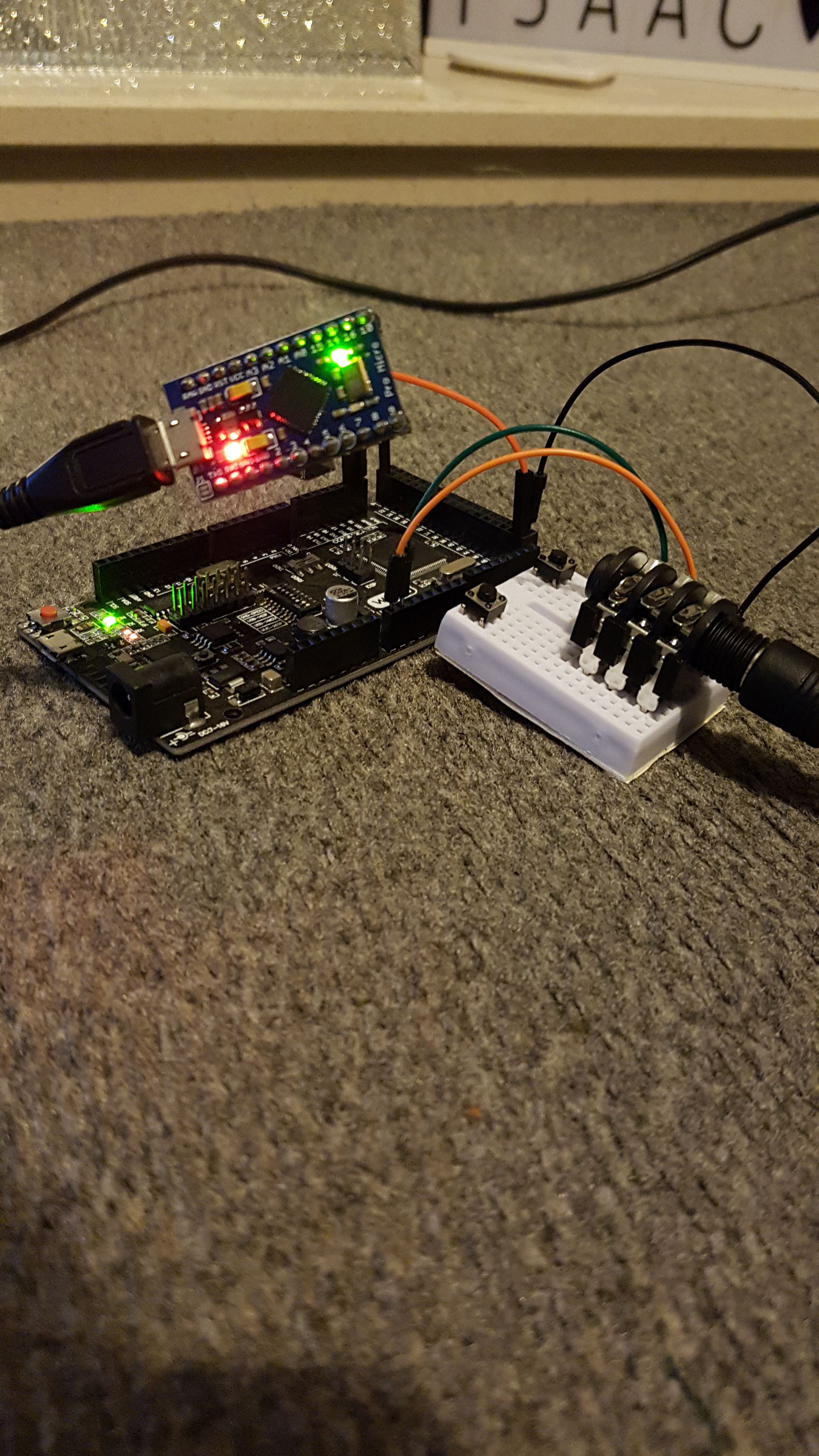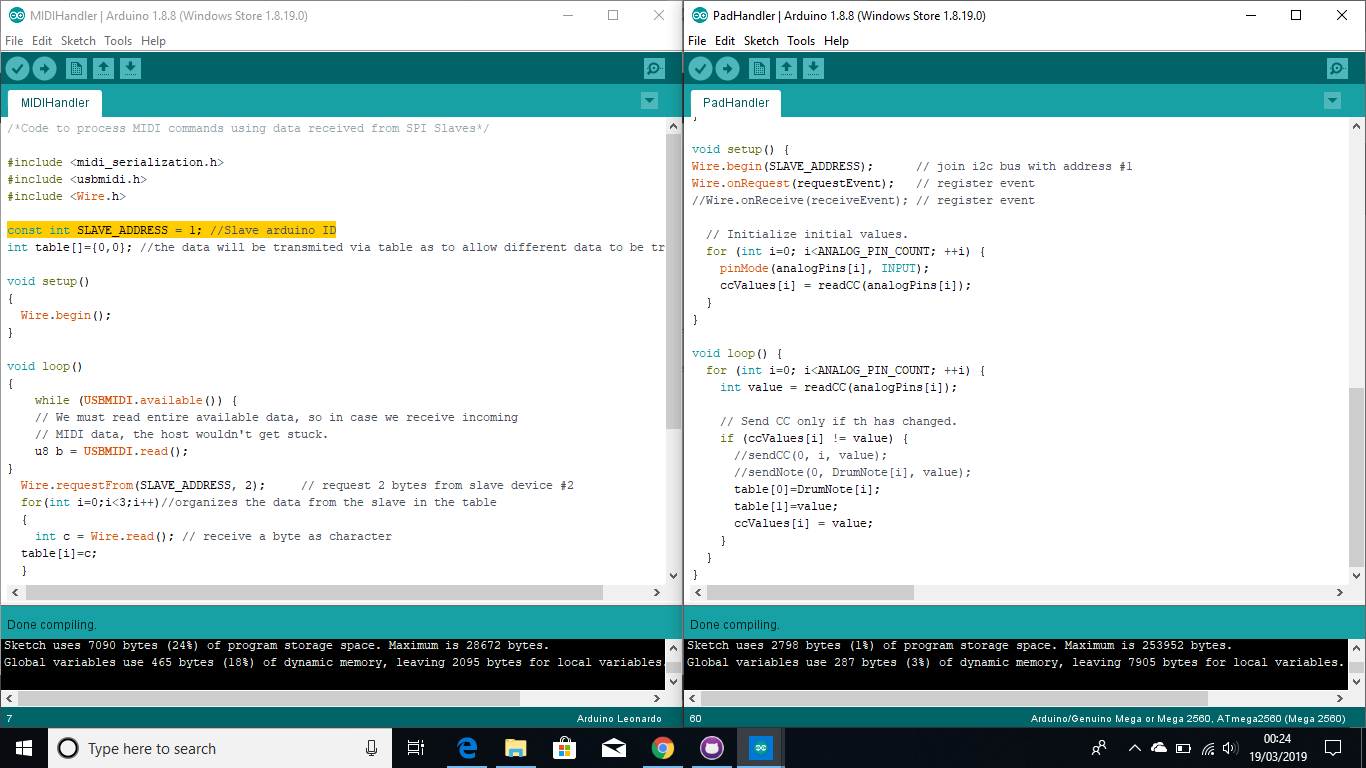-
Building a test unit
08/13/2020 at 23:26 • 0 commentsNow I have a bit more of a clear game plan it's time to assemble a box to test with.
I had an old black enclosure I'd bought for my Pi powered Guitar effects pedal that didn't end up getting used, so I've drilled in some holes for jack sockets and a hole for a power cable.
There are 4 jacks; 3 x stereo pad inputs and 1 x stereo output.
Inside the case I've added an Arduino Micro, mini breadboard and a breadboard power supply.
The input jacks will be having some wires soldered to them and attached to the arduino's analog pins and 5v rail via the breadboard; using a breadboard in this instance allows for the inputs to be free configured for different input devices easily.
The output jack will have a 3.5mm audio cable chopped and soldered onto it and plugged into a Pi 3, which will be mounted in the case very soon; quality doesn't need to be great for testing, but I have a justBoom amp/DAC HAT which would vastly improve the quality of the ouptut.
For the software I'm going to load Patchbox OS onto the Pi, as it is preconfigured for low latency audo performance, and can run Pure Data well.
Coding for the Arduino will be fairly simple; loop through analog pins and check the value. If it is >0 and greater than the previously checked value then a hit has been detected, so send a corresponding serial message for the pure data patch to then route and play the correct sample.
-
Project back on!
08/12/2020 at 19:47 • 0 commentsMy SamplePad controller MkI worked well, but there's room for improvement. I'm now considering this project my mains project, and will be documenting my experiments with Pure Data, Arduino and the 4051 analog expander chips for adding more analog pins and reducing the number of Arduinos needed.
Booyah!
-
Project still in development
08/23/2019 at 00:22 • 0 commentsJust a quick update on this project of mine :)
I haven't forgotten about this project, however a lot of the development for the software of this one is intertwined with my #DIY SamplePad Controller project as well; both will use the same code to read the pads and then just process them differently. This project's Arduino Mega uses a single serial port to pass data to the Pro Mini for turning into MIDI output, and the SamplePad's Mega uses four software serial ports for sending commands to four DFplayer mini boards.
There's a strong chance Id like to leave an option for MIDI output on the SamplePad in the future, so it makes sense to develop the Megas code for both projects as one, with options to turn features on/off in the sketch.
-
I2c Testing
03/21/2019 at 00:50 • 0 commentsJust a little update tonight, testing out my i2c premise.
The Mega successfully passes data to the Pro Micro, which is great news.
Now I just need to tighten it up and make sure it's fast and robust, then tidy up the Mega's pad reading code.
Then it'll be time to stick a load of Jack sockets in a box with lots of Arduinos ha ha!

-
Draft Code | i2c
03/19/2019 at 00:32 • 0 commentsFirst draft of code written, ready to test tomorrow:
I have taken some working test code I had written for the Pro Micro and splits out its functions; the pro micro now becomes an i2c master, converting receive data into MIDI commands, and the slave device will focus on reading pads and sending values back to the master. In this example I'll be putting the slave code onto a Mega, giving 16 analog inputs (enough for 8 pads).
If this works I'll be a happy man, as it'll allow me to easily add more slaves to give me the number of analog inputs needed, or allow me to use clusters of smaller boards, such as Nanos.
MIDI Drum Module (MkII)
A Roland-compatible drum module. Built using mostly off-the-shelf parts.
 Craig Hissett
Craig Hissett
